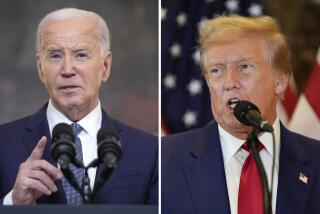In Egypt, ex-President Morsi calls his trial illegitimate
CAIRO — The chaotic scenes and defiant shouts that marked the opening of Mohamed Morsi’s trial Monday suggest that Egypt’s military-backed government may face a long struggle to bring the deposed Islamist president and his Muslim Brotherhood to heel.
Emerging from four months in captivity at a secret location — later revealed as a military base near the Mediterranean city of Alexandria — Morsi, on trial on charges of incitement to murder, faced the judge from inside a specially constructed defendants cage, loudly declaring that he did not accept the legitimacy of the court proceedings. The judge adjourned the case until Jan. 8.
The ousted leader, eschewing the prison-issued white garb of his fellow defendants, wore a dark jacket and open-necked shirt instead.
“I am the legitimate president!” he shouted again and again, sometimes drowning out the judge, according to official media reports and courtroom witness accounts. A wild melee broke out between Morsi’s foes and backers in the courtroom, with rival spectators hurling shoes at each other — a grave insult in the Muslim world.
The presiding judge, Ahmed Sabry Youssef, twice called recesses when raucous chanting made it impossible to continue. Opponents of the former leader, including some Egyptian journalists who had been allowed inside with press credentials, shrieked: “Execute him! Execute him!” Morsi could face the death penalty if convicted.
Outside the heavily fortified police academy that housed the makeshift court, Morsi’s supporters gathered in a dusty no-man’s land, prevented by rolls of barbed wire and rows of police from getting too close to the compound’s outer walls. “Down with military rule!” they shouted in voices hoarse with passion. They also yelled denunciations of Gen. Abdel Fattah Sisi, the army chief who brought Morsi down in a coup July 3.
Moving amid a forest of TV trucks, the ex-president’s partisans maneuvered into camera range to flash the four-fingered salute, alluding to the name of the Cairo mosque complex where hundreds of Morsi backers were killed by security forces in August. The salute has become a signature of the pro-Morsi protest movement.
The trial venue was moved at the eleventh hour to the police academy, whose location on Cairo’s eastern outskirts was more difficult for demonstrators to reach. Tear gas was fired to break up larger demonstrations elsewhere in the capital, and tinderboxes such as Tahrir Square were cordoned off by troops in armored personnel carriers. The city’s normally heavy traffic was light, with many people staying off the streets.
The court session was not televised live, but state TV later showed scenes of the deposed president arriving and in the courtroom with the audio muted. Access to the proceedings was strictly controlled; even some lawyers, clutching letters of permission to attend, were barred from entering.
Those allowed inside, including some journalists, were not allowed to bring cellphones, but during the session, accounts filtered out via activists and social media, in addition to the official reports.
The start of Morsi’s court proceedings marked a strange historic confluence: Two of Egypt’s former presidents are on trial. Hosni Mubarak, the longtime autocrat who was forced out in a popular uprising in 2011, is in the midst of a retrial after his conviction on charges tied to the killings of hundreds of protesters, with intermittent hearings being held at the same court in the police compound.
Morsi, along with 14 other senior figures in the Muslim Brotherhood, faces charges stemming from deadly clashes outside the presidential palace in December, midway through his year in office. His lawyers say that violence broke out because police refused to protect the palace.
Morsi’s supporters demand his reinstatement, something the military-backed government says will never happen, regardless of the trial’s outcome.
In the months since Morsi’s ouster, Egyptian authorities have taken a series of harsh measures against the Muslim Brotherhood. The group has been banned, and thousands of its supporters are in jail. Human rights groups say the death toll among pro-Morsi protesters since the coup tops 1,200.
Until his arrival at the court — he was flown in by military helicopter and then taken to the academy by minibus — Morsi had been held at an undisclosed location, with almost no contact with the outside world. State TV said that after the court appearance, he was taken to another prison outside Alexandria, while the other defendants returned to Cairo’s notorious Tora prison.
Television coverage of Morsi’s arrival showed him looking relaxed and confident as he stepped from a minibus, with police holding his arms. Attorney Taha Sayed Ali, who has defended Brotherhood figures and was present for Monday’s session, said Morsi made a four-fingered wave as he entered the courtroom.
The deposed leader’s supporters say the trial is a sham. Secretary of State John F. Kerry, during a visit to Egypt on Sunday, publicly called on Egyptian authorities to follow fair judicial practices, albeit without referring specifically to Morsi’s case.
Human rights groups have said Muslim Brotherhood detainees have been systematically denied due process, but Egyptian officials insist the trial will be fair.
Special correspondents Amro Hassan and Ingy Hassieb contributed to this report.
More to Read
Sign up for Essential California
The most important California stories and recommendations in your inbox every morning.
You may occasionally receive promotional content from the Los Angeles Times.










